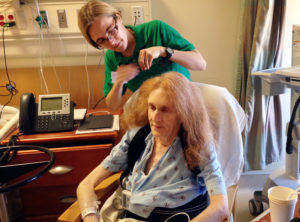Happy Monday – I hope you had a wonderful Thanksgiving holiday, spent with family and friends. We are certainly thankful for our subscribers, today and every day! Each Monday we recap the mature marketing stories from the past week that generated significant interest.
Today, we explore the positive impact of companions in geriatric healthcare and why we shouldn’t necessarily call it “retirement” anymore. We’d love to hear your thoughts, so be sure to post your comments below.
MOST CLICKED: One of my primary motivators for working with organizations who support boomers and seniors is that they are industries jam packed with caring individuals who want to help those they serve live as vibrant lives as possible. It’s what drew me in at a relatively early phase of my professional career.
 Recently, NPR shared the story of how one hospital system in California is leveraging companionship for geriatric patients as a way to combat loneliness. The article shares the stories of one young volunteer who aspires to be a doctor and volunteers weekly companion. Companions are there to have a friendly conversation, help troubleshoot small problems that may arise and are also trained in how to respond to medical emergencies (so they can provide a sense of calm to the patient should a problem arise).
Recently, NPR shared the story of how one hospital system in California is leveraging companionship for geriatric patients as a way to combat loneliness. The article shares the stories of one young volunteer who aspires to be a doctor and volunteers weekly companion. Companions are there to have a friendly conversation, help troubleshoot small problems that may arise and are also trained in how to respond to medical emergencies (so they can provide a sense of calm to the patient should a problem arise).
For Life Plan communities and organizations that focus on the higher levels of care, the benefits of such programs are two-fold:
- Positive medical outcomes for patients
- Fostering interest among younger professionals within our industry to help bolster the workforce
The ultimate benefit? Helping even more individuals live well and thrive.
MOST SHARED: I may be retired, but I’m not done yet! I’ve heard this and similar sentiments when speaking with boomers and seniors regarding how they describe their retirement years. G. Richard Ambrosius must have received similar feedback, as evidenced by a recent article he penned about the need to retire the term retirement.
According to the article:
We have all too often replaced purpose with pills; productive lives with early retirement packages; personal significance with shallow volunteer opportunities; and meaningful involvement with mindless activities. One might make a case, that “retirement” itself is a root cause of rising healthcare costs, the growing incidence of Alzheimer’s disease, diabetes and depression.
For some (the media especially), there is a sense that retirement equals being put out to pasture. I couldn’t disagree more! At Creating Results we are fortunate to work with organizations who believe in creating interest and purpose among their boomer and senior constituents. The author highlights programs which were designed to ‘care for the elderly’, arguing that it’s not care they need, it’s opportunity. He highlights organizations such as Civic Ventures and The Eden Alternative, both of which have missions to introduce meaningful, engaging opportunities for older adults to help them age well.
As marketers, we should carefully examine how we position our clients and the lifestyle/programs they offer, making sure it showcases the rewarding and beneficial impact on aging.
Click here to read more on this topic.


